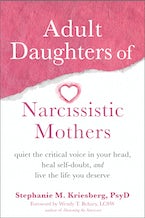By Stephanie M. Kriesberg, PsyD, author of Adult Daughters of Narcissistic Mothers
It’s a broad topic, and like many areas of psychology, mental health professionals have several perspectives on it. In this, we’ll look at information that helps you understand your mother. At their core, narcissistic mothers, like all narcissists, are driven by “pathological insecurity” (Durvasula 2021).
We’re all insecure sometimes, especially if we were raised by a narcissist. However, a narcissist is unaware of how her fragile self-esteem drives her behavior. She’s unaware that her need to be number one, or constantly cared for by others, fuels how she treats other people. She feels entitled to special treatment.
When she doesn’t receive this, she reacts in a variety of ways, from becoming enraged and attacking to becoming depressed and needy. All these reactions spring from the emptiness inside her.
Narcissism is a personality style composed of a constellation of traits and behaviors. If you think of a whole personality like a unique jigsaw puzzle, then the individual puzzle pieces are the personality traits. They fit together, creating a picture of the person. An outgoing, friendly, and easygoing friend has pops of bright colors. An introverted, quiet, more sensitive friend picture has more muted shades. When it comes to the narcissism puzzle, let’s pay attention to a few key pieces.
You may recognize some of the following behaviors or personality traits common to people with narcissism (adapted from Fox 2018):
- Takes advantage of others to achieve her own goals
- Reacts to criticism with rage
- Has excessive feelings of self-importance
- Exaggerates achievements and talents
- Is preoccupied with power and success fantasies
- Has unreasonable expectations of favorable treatment
- Needs constant attention and admiration
- Exhibits obsessive self-interest
- Pursues mainly selfish goals
Narcissism occurs on a spectrum. That means your mother may have had a few narcissistic traits and behaviors that impacted her functioning somewhat. She may have had a lot of them that showed up all the time, in almost all situations in her life. The most extreme and inflexible form of narcissism is called “narcissistic personality disorder” or NPD.
NPD occurs in approximately 1 to 2 percent of the population. Whether your mother’s narcissistic traits and behaviors came and went or whether she had full-blown NPD, the impact of unhealthy narcissism can take a heavy toll.
Stephanie M. Kriesberg, PsyD, has practiced clinical psychology for twenty-five years. A graduate of the Ferkauf Graduate School of Psychology of Yeshiva University, she is trained in psychodynamic psychotherapy, cognitive behavioral therapy (CBT), and acceptance and commitment therapy (ACT). In addition, she is trained in the practice of clinical hypnosis. Kriesberg is on the board of the New England Society of Clinical Hypnosis.



 2024 Peace Playbook: 3 Tactics to Avoid Clashes with Your Partner
2024 Peace Playbook: 3 Tactics to Avoid Clashes with Your Partner